

English and Scottish get drunk most often, 25-nation survey finds. The English and Scottish have topped an international league table of how often people get so drunk that they lose their balance and slur their speech.
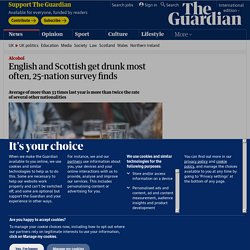
Statistics for alcohol treatment in England: falling numbers - Alcohol Policy UK. Public Health England (PHE) have released alcohol treatment figures in England for 2016-2017 within a combined report of drug and alcohol treatment data.
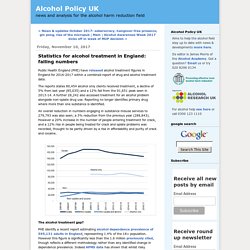
The reports states 80,454 alcohol only clients received treatment, a decline of 5% from last year (85,035) and a 12% fall from the 91,651 peak seen in 2013-14. A further 28,242 also accessed treatment for an alcohol problem alongside non-opiate drug use. Reporting no longer identifies primary drug where more than one substance is identified. An overall reduction in numbers engaging in substance misuse services to 279,793 was also seen; a 3% reduction from the previous year (288,843). Not remotely refreshing: global health fund rebuked over Heineken alliance. A global health fund has come under severe criticism over its decision to partner with Heineken, a move campaigners warn will “undermine and subvert” alcohol policy implementation in Africa.
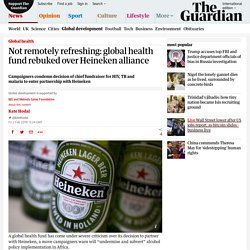
In an open letter to the Global Fund to Fight Aids, Tuberculosis and Malaria, an alliance of more than 2,000 health organisations voiced misgivings about the alliance and called for its immediate end. “We are deeply concerned about this partnership and its implications for global health,” read a letter signed by Katie Dain of the NCD Alliance, Kristina Sperkova of the anti-alcohol group IOGT International, and Sally Casswell of the Global Alcohol Policy Alliance. “A partnership such as this with the Global Fund is of great value to Heineken. It redirects attention from the costs of harmful use of alcohol and positions Heineken to governments, the public and the global community as a legitimate partner in implementing sustainable development solutions.” … we have a small favour to ask. How secondhand drinking ruins lives: ‘Every family has been touched by this’ Helen Witty thought she had taught her children all about the dangers of drinking.
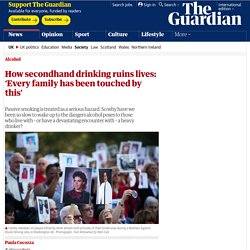
She was raised with the knowledge that her great-grandfather’s alcoholism had led him to suicide. New report reveals staggering cost to NHS of alcohol abuse. One in 10 people in a hospital bed in the UK are alcohol-dependent and one in five are doing themselves harm by their drinking, according to research that quantifies for the first time the massive burden to the NHS of Britain’s drinking culture.
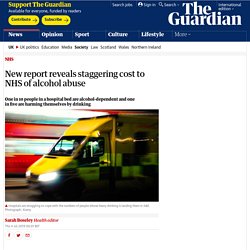
Hospitals are struggling to cope with the numbers of people whose heavy drinking habits land them in A&E or mental health units, but while the NHS estimates that the cost of treatment runs to £3.5bn a year, the figures for the numbers of patients affected have been largely anecdotal. A major review pulling together the results of 124 previous studies involving 1.6 million hospital inpatients reveals that 20% use alcohol harmfully, for instance by binge drinking, while 10% are dependent on alcohol. Experts say alcohol services in the NHS and the community have been cut, leaving a health service fighting to cope. Roberts was “super-concerned” by the findings, if not astounded, because he had expected the worst. Britons get drunk more often than 35 other nations, survey finds. Drinkers in the UK get drunk more than any other nation in the world, findings from a global survey suggest.
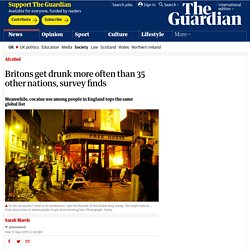
Britons reported getting drunk an average of 51.1 times in a 12-month period – almost once a week – the report featuring 36 countries found. On average, respondents said they got drunk 33 times in the last year. This number was 50 times in the US and 48 times in Canada. The rate was much lower in countries such as Chile, where they got drunk 16 times a year. The Global Drug Survey, of more than 120,000 substance-users worldwide, also found that England has the highest rate of people having tried cocaine in the world. Hold my beer: how it all went wrong for Heineken in Africa. Heineken has made a lot of money in Africa © Max Pixel Heineken is a global powerhouse.
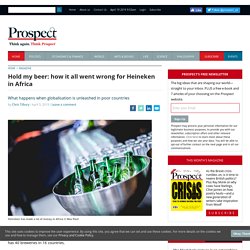
The Dutch beer brewer is responsible for Amstel, Tiger, Desperados, Foster’s and Strongbow in Europe, as well as the Heineken brand itself. Overseas its operation extends across Asia and the Americas—as well as Africa, where it has 40 breweries in 16 countries. Lauded in 2013 by Heineken CEO Jean-François van Boxmeer as “the international business world’s best kept secret,” Africa is central to the company’s success. Low production costs mean that beer sold there is almost 50 per cent more profitable. But Dutch journalist Olivier van Beemen, the author of this well-researched and provocative book, has uncovered an astounding counter-story to the corporate spin. Low booze consumption does not protect people from strokes, study finds. A low level of alcohol consumption does not protect against stroke, new research suggests, in the latest blow to the idea that a few drinks can be beneficial to health.
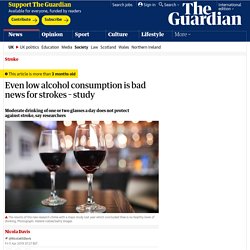
At least 100,000 people have strokes in the UK every year, according to recent figures. It had been thought that low levels of alcohol consumption might have a protective effect against stroke, as well as other diseases and conditions. Tainted alcohol kills at least 84 people in India. At least 84 people have died from drinking toxic bootleg liquor in the north-east Indian state of Assam, and about 200 others have been hospitalised, a government minister said on Saturday.
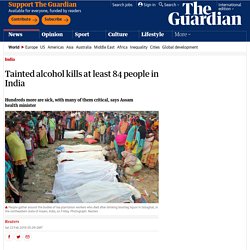
The deaths come less than two weeks after more than 100 people died from drinking tainted alcohol in northern India. Assam health minister Himanta Biswa Sarma said: “Every 10 minutes we are getting reports of casualties from different places. So far about 200 people are in hospital with many of them critical.” Doctors from nearby districts and other medical colleges have been rushed in to deal with the crisis, said Sarma, after visiting patients at Jorhat, about 300km (190 miles) east of the state’s financial hub, Guwahati. Deaths from illegally produced alcohol, known locally as hooch or country liquor, are common in India, where many cannot afford branded spirits. Heineken claims its business helps Africa. Is that too good to be true? India: more than three dozen die in bootleg liquor poisoning. 'The smell of booze was part of the fabric of my childhood': the hidden victims of alcoholism.
George Clarke asked his father not to text him when he went on holiday to Valencia in September 2015; he didn’t want his father to be charged the extra fees.
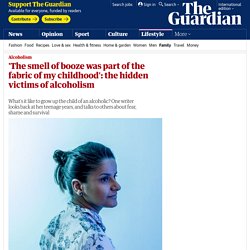
When Clarke, 25, landed back in the UK a week later, he headed straight to the restaurant where he worked as a waiter. His boss told him that one of his father’s neighbours had called while he was away – she was concerned about his father. Clarke had had messages like this before, and figuring his father was on one of his regular drinking binges, ignored her message. But two weeks later, the same neighbour called again. Clarke drove to his father’s flat, two miles from where he lived in Holmfirth, Yorkshire. “The next thing I knew, there was this big, 6ft 8in man covered in tattoos outside the flat with one of those battering rams they use in drug raids, trying to smash the door down,” Clarke says. Theconversation. Millions of pounds is spent each year to bombard us with information on the risks of alcohol.
But do such campaigns work? Our research shows that some simple tweaks to how the message is delivered – by applying findings from behavioural science – could help government campaigns have a far bigger impact. And cost savings might even go some way to filling the £22 billion funding black hole the NHS finds itself in. Excessive drinking is a big problem. Plain packaging and graphic warnings will ‘crush’ craft drinks, says gin master. It’s enough to make Jared Brown spill his drink. The co-founder and master distiller behind Sipsmith, the micro-distillery in the vanguard of the craft gin movement in the UK, is contemplating the possibility of graphic warning photographs and plain packaging appearing on bottles of alcohol, akin to the restrictions on tobacco that assume full force in May. “Are they considering similar labels for bacon? Fish and chips? Crisps?” He demands. In December, a report from the government advisory body Public Health England suggested that bottles of alcohol could be sold in plain packaging and carry larger health warnings, including photographic warning labels.
Under current arrangements, there are no mandatory requirements for alcohol labelling, although a voluntary “responsibility deal” requires the drinks industry to include warning labels indicating the unit alcohol content, the chief medical officer’s alcohol guidelines and a pregnancy warning. Public attitudes towards alcohol control policies in Scotland and England: Results from a mixed-methods study.
Open Access Highlights UK alcohol policies restricting access to alcohol via pricing are the least popular. How alcohol industry organisations mislead the public about alcohol and cancer - Petticrew - 2017 - Drug and Alcohol Review. Introduction and Aims Alcohol consumption increases the risk of several types of cancer, including several common cancers. IAS warns over wide scope of parental drinking impact on children - Alcohol Policy UK.
A new Institute of Alcohol Studies (IAS) report exploring the effects of drinking amongst non-dependent parents has been released in partnership with the Alcohol and Families Alliance and Alcohol Focus Scotland. Download “Like sugar for adults: The effect of non-dependent parental drinking on children & families” [pdf] The report suggests a range of negative impacts from parental drinking can start at even moderate levels, though harms increased in line with consumption. The IAS states the research shows 'parents do not have to regularly drink large amounts of alcohol for their children to notice changes in their behaviour and experience negative impacts'. Seeing a parent tipsy or drunk was associated with children feeling worried as well as experiencing negative impacts such as unpredictable parental behaviour.
No healthy level of alcohol consumption, says major study. Even the occasional drink is harmful to health, according to the largest and most detailed research carried out on the effects of alcohol, which suggests governments should think of advising people to abstain completely. One in 20 of all deaths due to alcohol, says WHO. Lancet review on alcohol harm prevention strategies.
Theguardian.